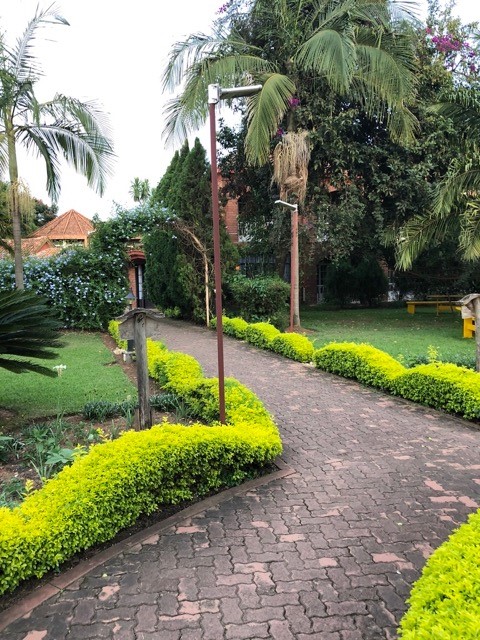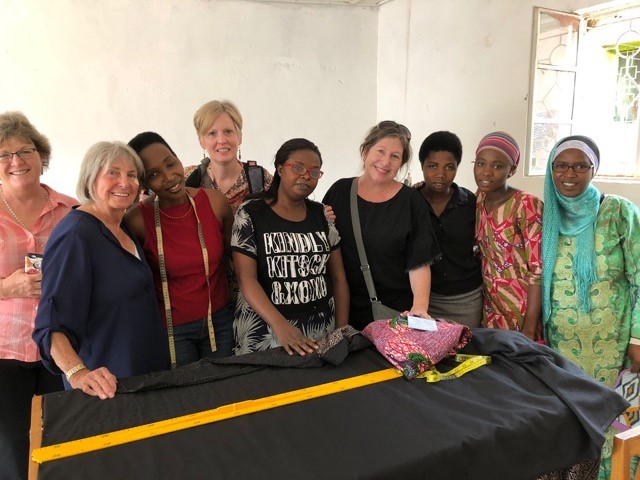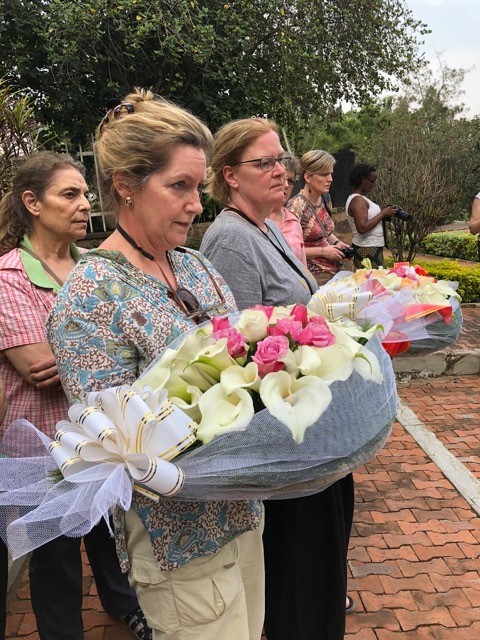
Rwanda 2018 – Day 2 – Rwandan Culture, History, and the 1994 Genocide
By Jackie Saber (Raleigh, NC)
Walking from my room along the beautiful Chez Lando’s fragrant paths, lined with neatly trimmed green hedges and what seemed like the aroma of honeysuckle, on my way to our morning gathering. Air shifting, not quite a breeze but enough to fill my ears with the sound of a certain humming of activity throughout the grounds, all a pleasant and soothing start to what would, in contrast, be one of the most emotionally intense days, for me, of our learning journey to this amazing small country in the middle of East Africa. We were off first to the deeply inspiring Nyamirambo Women’s Center, in one of the poorest traditional neighborhoods in Kigali, to learn how women have taken matters in their own hands, struggled to earn, to learn. In the afternoon, the Kigali Genocide Museum. After a delicious cup of coffee with hot milk and an omelette at our lovely hotel Chez Lando, I boarded our bus with incredible curiosity, excitement, along with a bit of jet lag. Soon, though, I was completely immersed in the incredible day that was to follow…..although a long-time advocate for women and children and a donor to women’s giving funds, I am entirely new to Dining for Women (DFW) and can’t wait to get out and see some of the projects that have been funded and learn what’s working, what’s not, and what information we might gather from the women in the community to take back to DFW.
“Muraho” – hello! Are you well? “Murakoze” – thank you! “Mwaramutse” – good morning! With a few phrases that our wonderful guide, Francoise, taught us, we were ready to learn a few facts. Before the 1994 genocide, women did not have meaningful economic independence, could not inherit property, had little access to learn how to read and write or general education. Without access to skills to earn, women had a hard time paying for their children’s schooling and basic supplies. Rwanda’s population is close to 12 million, and I was surprised to learn only about 1 million live in the capital, Kigali. Most Rwandans live in rural areas. We were to see much more later in the week about the particular challenges rural women face. Health care has improved post genocide, and a health policy costs about $2 per person. The government encourages co-farming among families on the same hill to grow similar crops so they can group together to sell the excess and share the profits.
NYAMIRAMBO WOMEN’S CENTER
We entered the doors of the Nyamirambo Women’s Center library room, and lined up on benches below shelves of books that now are available for the community. Started with 500 books for children, now elders care for the library and help the children there too. Mary, the Women’s Center’s project manager, fills us in on a remarkable success story. A woman can learn to sew and earn a little. With three sewing machines kept at the center, they can teach others while working and earning. The children can be nearby in the library while they work, then they can start using some of the profits to send the children to school. Post genocide, neighborhood ethnic differences are blended and women from different backgrounds, tell us that “we are all Rwandan” is the preferred phrase. In the past, girls were not sent to school but trained only in housework. At the Women’s Center, they are taught English, computer courses, sewing machine skills, cooking classes, and basket weaving. Over the years, women kept sewing, more space was rented, and soon a small shop was opened where they can sell their goods. I learn they sell Indego Africa products, a past DFW grantee! Visitors became interested in the Women’s Center, and now the women have formed a cooperative and run a thriving tourism component, such as the neighborhood tour we were beginning. Note to self: this model is working, and I think to myself I would like to take back that DFW dollars would be well-spent on this type of project that “multi-tasks” so well in meeting so many needs of women and children.
Claude and Shema are the two young men who take us on a tour through the town, and we end up at Claude’s mother’s home for a delicious home-cooked lunch. We very much welcome the cold lemonades and Fantas! We taste “chipate” and traditional dishes like stewed white sweet potatoes and yummy rice, beans, and chicken. We wander the neighborhood and see children in their uniforms returning from school on the dusty streets, younger siblings getting water from the community faucet, a man ironing used clothing for vendors to sell in the street markets, women making rice, cassava roots drying on cloths on the sidewalk, men drinking milk at the popular “milk bars” in town. Milk bars? I learned milk is very, very popular and encouraged as a healthy social drink. We stop by the local hair salon to learn how a young woman has opened a salon to earn, and a few of us are excited to hire her to braid us an extension which we sport proudly for the rest of our week.
Sights and sounds and dust and heat combine with warm smiles, beautiful children. I will forever remember how the women in the sewing center welcomed me with smiles and laughing once I greeted them tentatively but hopefully with my first attempt at “Muraho!” Women connect with other women all over the world in a natural way when we share smiles and stories of making our lives and those of our families better. This is what DFW is all about. Throughout the week I was to come to know this as a certainty, and I am forever changed because of the beautiful moments I spent connecting with other women…mothers, leaders, strugglers, those who are silent, those who are quiet, shy or robust. My own mother is along with me on this trip and when I introduce her, I love the usual response of the women with a collective “ohh, hmm” and big smiles of welcome and honor to my mother. I think this extends to all mothers, who are deeply revered in the Rwandan culture, as I am to learn throughout the week. I never get tired of this and am so proud of my Mom! What an amazing first morning in Kigali.
KIGALI GENOCIDE MEMORIAL
High upon a hillside, we pass through security gates and begin to feel the weight of what we are about to experience. To know of the 1994 Genocide is one thing, to be on the site of this remarkable memorial is quite another. Within a 90 day time span, between 800,000 and 1 million people were murdered with machetes or other crude tools, wielded mostly by neighbors and angry mobs.
No words are sufficient, or useful, in confronting this reality, this completely unimaginable loss. But it is being confronted, each and every day and minute, by the men and women and children of Rwanda. How this country is forging ahead seems impossible, but the Genocide Memorial is a sacred space that honors the murdered, educates the survivors, and provides a important place for survivors to share their stories. The memorial has had 800,000 visitors so far, last year alone more than 90,000.
“The world needs to know that survivors are there and those survivors need to live a good life and that they need to be respected.”
…Quote from a film at the Memorial in which a male survivor tells the devastating truth of his crushing loss of all his family murdered in the genocide.
“You can never be the same person again….my children might be ok but I can never be.”
…Quote from a film at the Memorial in which a female survivor tells of her entire family being murdered in the genocide.
I am quiet, and profoundly honored to bear witness to this loss of humanity and cruelty. I’m surprised that I don’t cry but instead feel incredibly resolute, to continue the work of honoring the survivors with listening. So they know someone cares, that they are not walking this path of survival alone, although I know in my heart it is a walk they are forever walking alone. Two members of our group lead us as they lay two lush and beautiful flower wreaths on one of the mass graves where over 250,000 victims have been buried. I think to myself I am proud that Francoise and DFW has arranged for such spectacular flowers.
Before we leave, we are honored with a private meeting with Serge Rkiigamba, a young man who survived the genocide but lost 60 family members. My mind is having a hard time comprehending that fact. He has chosen to share his story with us and other visitors to the memorial and talk about the genocide with us in an open way that is evidently not shared by many in the Rwandan culture, saying “I want my country to be an example to the world.”
We learn that survivor support groups for mental health are sparse, and that he feels all of Rwandans are traumatized, still, even the current generation, because they carry the weight of their parents’ silence, or memories, even if they don’t know details. Many Jewish families come to visit the Genocide Memorial and share experiences of loss and trauma, and Serge tells us there is a project to record memories of survivors, similar to how the Jewish community is recording first-hand accounts of the remaining Holocaust survivors. He tells us that reconciliation = peaceful cohabitation and that this is a difficult task but the country is forging ahead, and he is trying to do his part to teach about the dangers of hate.
I make a note to check to see if DFW has funded support groups for women and children survivors. Later I learn that DFW has supported Foundation for Rwanda peer support groups for women who were raped during the genocide and bore children as a result. From Serge, I learn there is a current deep need for similar peer support groups to help with emotional trauma, and I hope to pass this along to DFW as well. Maybe we can make a small difference.
“The narrative has been completely changed,” he ends with. I am forever shocked over and over by humanity’s inhumanity against humans. I am also forever surprised and full of admiration for the strength humans have and their will to survive. I will never forget our conversation with Serge. There is nothing I can offer to him on this day except that I will carry and honor the time I was able to spend with him and bear witness to his pain, his life, and the collective trauma of the women, children, and men of Rwanda.
A powerful first full day in Rwanda! Having honored the past, I am hopeful in the new day tomorrow where we will begin to really explore the projects and ways and means that are helping the remarkable women and children of Rwanda take their lives in a new direction……..forward! I am newly inspired to get back home and spread the word about the excellent investment in women and children that is DFW and am grateful for the opportunity to travel and learn with this amazing group of women. Together, we can change ourselves for the better and can make another woman’s life a bit better. I’m all in!
We end our day sharing a wonderful dinner together at local restaurant “Republica” – a delicious combination of great food and new friends!



